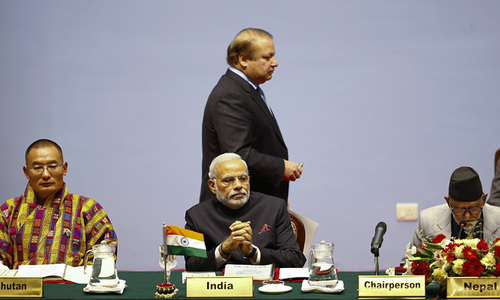NEW DELHI/ISLAMABAD: The South Asian Association for Regional Cooperation (Saarc) summit scheduled in Islamabad in November seems to be in peril after an Indian announcement on Tuesday that Prime Minister Narendra Modi would not attend it.
India’s external affairs ministry said in the statement that there were other countries that had expressed reservations about participating in the summit amid heightened tensions over terrorism.
“India has conveyed to current Saarc chair Nepal that increasing cross-border terrorist attacks in the region and growing interference in internal affairs of member states by one country have created an environment that is not conducive to the successful holding of the 19th Saarc summit in Islamabad,” it said.
“In the prevailing circumstances, the government of India is unable to participate in the proposed summit in Islamabad,” it said. “We also understand that some other Saarc member states have also conveyed their reservation about attending the Islamabad summit.”
FO spokesman deplores India’s ‘unfortunate announcement made through tweet’
Reports quoting unnamed sources said Afghanistan, Bangladesh and Bhutan were the other countries to have said no to attending the summit.
India had earlier held up another Saarc summit due to its tensions with Pakistan: the Kathmandu summit in Jan 2002. India kept its air corridor closed to Pakistan when it agreed to the Nepal gathering. Then president Pervez Musharraf chose to fly in via China, turning down Delhi’s offer to make an exception by opening the air corridor for him. That summit is still remembered for Gen Musharraf’s outstretched hand, which forced then Indian prime minister Atal Bihari Vajpayee to clasp it.
In a communication to Nepal, reported by the Indian media, India has said it remains steadfast in its commitment to regional cooperation, connectivity and contacts but believes that these can only go forward in an atmosphere free of terror.
The announcement came on a day Indian Foreign Secretary S. Jaishankar issued a second demarche to Pakistan High Commissioner Abdul Basit over the Sept 18 Uri attack in which 18 soldiers were killed. The attack has triggered a sharp response from India as officials clamoured to review the 56-year-old Indus Waters Treaty. India is also believed to be reconsidering the Most Favoured Nation status granted to Pakistan, reports say.
The two countries have been engaged in an unsavoury verbal duel at the United Nations.
In Islamabad, a spokesman for the Foreign Office said that they had come to know about the Indian decision against participating in the summit through a tweet of a spokesperson for the Indian government and had not received any formal communication in this regard.
In a tweet, the FO spokesman termed the Indian announcement “unfortunate” and said that Pakistan remained committed to peace and regional cooperation.
“We will continue to work to that end in the larger interest of the people of this region. As for the excuse used by India, the world knows that it is India that has been perpetrating and financing terrorism in Pakistan,” the spokesman said, adding: “Confession by Kulbhushan Jadhav, an official of the Indian intelligence agency RAW, is a living proof beside many other evidences.”
He said that it was India which had violated the international law and United Nations charter by interfering in internal affairs of a sovereign state, Pakistan.
India’s decision to withdraw from the upcoming Saarc summit has imperilled the major regional event. Technically, the summit, as per Saarc traditions, cannot go ahead after one of the member countries opts out of it.
Diplomats say the only hope of salvaging the summit is that other members, particularly Nepal or Sri Lanka, persuade India to review its decision.
Published in Dawn, September 28th, 2016













































